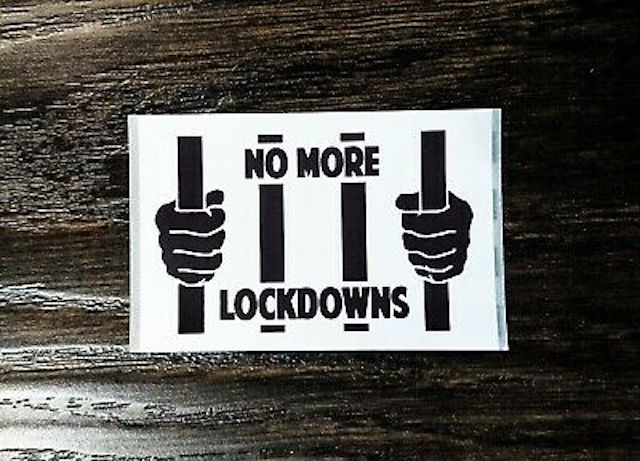Two years of unprecedented erosion of our freedom by the government during the pandemic – economic lockdowns, stay-at-home orders, travel bans, long forced quarantines, incarcerations – has brought the issue into a clearer focus than in the previous decades of gradual decline of freedom.
From studies and media reporting throughout the pandemic, we know the consequences of government restrictions on freedom. Shutting down businesses led to plummeting revenues, job losses, bankruptcies, and to supply chain disruptions, empty shelves, and lack of services. Unemployment, financial distress, and stay-at-home orders contributed to escalating drug abuse, domestic violence, depression, and suicides. Government regulation of health care has led to shortages of tests, treatments, hospital beds, and healthcare workers – and caused unnecessary deaths from Covid and from other diseases that have gone untreated as Covid patients have crowded the hospitals.
Early on, government restrictions, such as short-term economic lockdowns and stay-at-home orders could be justified when very little was known about the virus and vaccines and treatments didn’t exist. However, two years into the pandemic, despite all that misery and the vaccines and treatments now available, polls suggest that over a half of Canadians are still in favor of economic lockdowns and two thirds approve of mandatory vaccinations. Why?
A majority of Canadians welcome government control of their lives because they have never accepted the principle of freedom: that the government must not coerce them to do anything (except in retaliation for initiating force against others). They are comfortable being granted a little bit of freedom and letting the government decide when and to what extent that freedom must be compromised for the ”common good,” such as socialized health care. (No wonder the Canadian Charter of Rights and Freedoms gives legal sanction to the government’s restricting individual freedom when it deems it ”reasonable”).
Such a rejection of the principle of freedom has morally sanctioned the government’s increasing violation of that principle. Yet, the government’s coercive intrusion in our lives during the pandemic never achieved what it claimed: prevent deaths and protect us from the virus. The Covid outcomes are no better here than in countries (such as Sweden) that never imposed harsh restricions. Instead, the restrictions have been the cause of most of the pandemic misery (see an article that reports a study here). That is because we need freedom to live.
While it is true that we can survive physically (if spared serious disease) even when locked up in our homes and barred from working, such incarceration is not living a life. Living a life consists of pursuing and achieving values: productive work; health; meaningful relationships; wealth and all the material values it affords, from food and shelter to tools and technologies that make life more enjoyable; and art and recreation.
Our achievement of these and other values was hindered or prevented by government restrictions, because to pursue and achieve values, we must be free. First, we must be free to think to identify the values we want and to plan how to obtain them. This we can do, of course, even when locked up or otherwise restricted, but we cannot act to get the values unless we are free, either to create them ourselves, or to trade with others. Ask any owner, employee, or a customer of a restaurant, gym, a hair salon, or a retail store that the government ordered to shut down.
Thinking, producing, and trading freely are the source of the material values we need to live, but such freedom also allows the achievement of an important spiritual value: a sense of purpose that gives life meaning and helps in obtaining other values. Such a purpose comes from productive work. As studies now show, harsh government restrictions that prevent people from working have led not only to economic misery but to depression, drug abuse, and suicides when people lose their work – and their purpose.
Freedom matters because it creates the conditions for a flourishing life. The role of the government is to protect our freedom against coercion, not to violate it.
Those who never recognized the principle of freedom and the government’s role in protecting it, as well as the rest of us, are now facing the consequences, such as shortages of goods and services (including health care), escalating excess deaths from mental problems and untreated health conditions unrelated to COVID, and the upcoming economic misery from the ballooning public debt that will perpetuate the government-created economic devastation.
If we want to live again with purpose and flourishing, not just barely to survive in misery, we must protest government coercion and advocate for freedom.
Jaana Woiceshyn teaches business ethics and competitive strategy at the Haskayne School of Business, University of Calgary, Canada. She has lectured and conducted seminars on business ethics to undergraduate, MBA and Executive MBA students, and to various corporate audiences for over 20 years both in Canada and abroad. Before earning her Ph.D. from the Wharton School of Business, University of Pennsylvania, she helped turn around a small business in Finland and worked for a consulting firm in Canada. Jaana’s research on technological change and innovation, value creation by business, executive decision-making, and business ethics has been published in various academic and professional journals and books. “How to Be Profitable and Moral” is her first solo-authored book.



